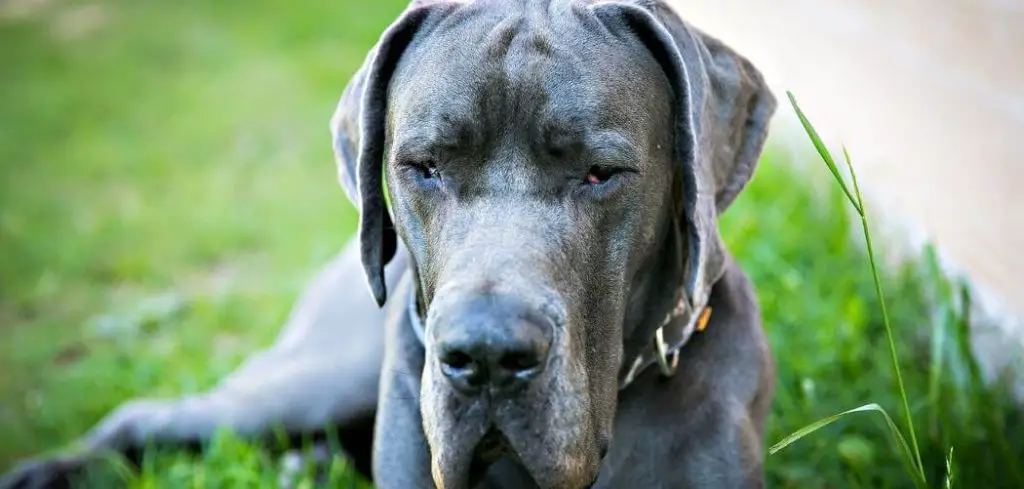Panting and a sudden loss of appetite in dogs can be alarming, especially if these symptoms appear together.
They can point to anything from mild discomfort to a serious underlying health problem requiring urgent care.
We outline the common reasons why dog is panting and has no appetite, what you can do at home, and when to seek veterinary help.
Dog Panting and No Appetite — Why It Happens
Panting combined with refusal to eat in dogs can be due to stress, illness, or pain. It may occur due to overheating, infection, internal pain, respiratory issues, or even emotional distress. In some cases, hormonal imbalances or heart conditions can trigger both symptoms at once.
Because appetite changes can develop quickly in dogs, this pairing should always be taken seriously.

Dog Panting and No Appetite: Common Causes
Heatstroke
When a dog overheats, panting becomes their main way to cool down. But severe heat can overwhelm their cooling system, leading to heatstroke.
Dogs with heatstroke often stop eating because their body is in distress and trying to focus on cooling down and survival.
Signs may include drooling, weakness, vomiting, and collapse. Heatstroke is an emergency and can be fatal without immediate veterinary care.
Read more: Dog Panting and Shaking All Day (Here’s why)
Pain or Injury
Painful conditions, whether from trauma, dental issues, or internal problems, can cause both panting and appetite loss.
Panting often signals discomfort, while refusing food may be your dog’s way of conserving energy.
Injuries might be obvious, like limping, or hidden, such as internal bleeding or joint pain. A dog in pain might also appear restless, hide, or become unusually clingy.
Gastrointestinal Problems
Upset stomach, pancreatitis, or intestinal blockages can lead to panting and refusing food. Panting may be due to abdominal discomfort, nausea, or dehydration.
Blockages in particular can escalate quickly, with symptoms like vomiting, bloating, and weakness.
These conditions often need prompt diagnosis and treatment to prevent severe complications.
Heart Disease
Heart problems can cause panting as the body struggles to get enough oxygen. Appetite loss can follow because the body is under stress and energy reserves are low.
Coughing, weakness, and exercise intolerance may accompany these signs. Left untreated, heart disease can significantly shorten a dog’s life expectancy.
Anxiety or Stress
Emotional distress, such as fear from fireworks, separation anxiety, or a sudden change in routine, can also trigger panting and appetite loss.
Some dogs pace, whine, or seek constant reassurance when stressed. While stress-related symptoms can resolve once the trigger is removed, chronic anxiety can affect overall health.
Infections
Bacterial or viral infections, such as kennel cough, pneumonia, or systemic infections, can cause fever, panting, and reduced appetite.
When the immune system is fighting off illness, appetite naturally decreases as the body diverts energy to healing. Fever and fatigue may make panting more pronounced.
What to Do If Your Dog Is Panting and Has No Appetite
Start by assessing your dog’s environment and comfort level. Ensure they are in a cool, quiet space with fresh water. If overheating is possible, move them to a shaded, well-ventilated area.
Offer bland, tempting foods such as boiled chicken and rice, but avoid forcing them to eat. Gentle encouragement is fine, but persistent refusal signals a need for veterinary attention.
Monitor for other signs like vomiting, diarrhea, coughing, or difficulty breathing. If these appear, or if symptoms worsen, professional evaluation is essential.
If stress or anxiety is the likely cause, remove potential triggers and provide reassurance. Soft voices, gentle petting, and familiar surroundings can help.
When to Call or Visit Your Vet
Seek veterinary help immediately if your dog is panting heavily and refuses food for more than 24 hours.
Go straight to emergency care if you notice collapse, severe weakness, blue or pale gums, vomiting with bloating, or labored breathing. These could signal life-threatening conditions.
Rapid changes in behavior, persistent lethargy, or worsening panting are also reasons for urgent assessment.
Dogs often mask pain, so any sudden appetite loss paired with breathing changes should never be ignored.
Read more: Dog Panting After Antibiotics (What it means and what to do)
Key Takeaway
Panting and a loss of appetite in dogs can range from mild stress reactions to serious medical emergencies. Prompt observation, supportive care at home, and timely veterinary consultation can make all the difference.
Always trust your instincts — if your dog seems unwell or their symptoms escalate, it’s better to have them checked by a professional than to wait and risk a serious outcome.
